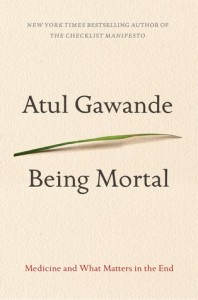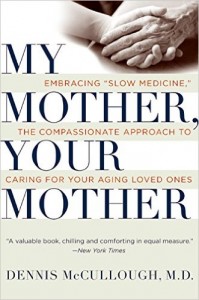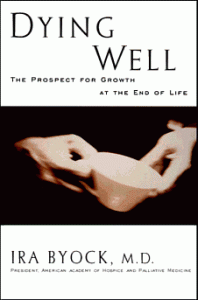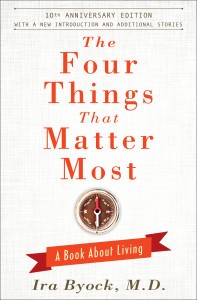
Last week, a friend told me that her elderly father whose kidneys are failing is refusing dialysis.
“It sounds like it’s time to have The Conversation,” I said.
“I know,” she sighed.
The Conversation, of course, is about Dying, and talking about it with an elderly parent can make you nostalgic for the awkward conversations you once had with your kids about sex. But in our modern age, if we don’t prepare for the end of our days, we could find ourselves in a medical purgatory not much to our liking.
We don’t have to; we do have the ability to control how well we live between medical appointments as we age, and we can take some control about how we want to die, though even the best laid end-of-life plans can be stymied by the proverbial on-coming bus. It is in these years of middle age, when so many of us are caring for our elderly parents even as we begin to acknowledge our own mortality, that having The Conversation is critical not just for the aging parents, but for all those who survive.
“Has he talked to his doctors about what happens if he doesn’t go on dialysis?” I ask.
“No.”
“And what about your brothers and sisters?”
My friend shakes her head. She’s the eldest of her siblings, and she knows it’s up to her to start The Conversation.
My friend’s parents are in their mid-eighties, in poor health, and determined to stay in their home even as the activities of daily living become increasingly difficult. Their four children are helping out unequally, laying the groundwork for future resentment. Families are complicated, and caring for elderly parents can be a big complication.
One of the complications is role reversal: No matter your age, becoming a caregiver to a parent is awkward.

Another is denial: My own mother hid her dementia from us for as long as she could, and my father helped, doing things like dialing the phone so we didn’t know she couldn’t remember ten digits at a time or even how to speed dial. I was caught between pretending that everything was fine and knowing it wasn’t.
Even while she was able, my mom never wanted to talk about her declining memory, or her plans for dying; she never wanted to die. She did at least have an advance directive, which was a good thing, because by the time she needed to make decisions about her quality of life at the end, she’d lost her memory and the ability to speak.
That was my cue for telling my kids things like, “If I have to be plugged in to be kept alive, turn off the machines!” And, “Don’t waste money on a casket. Just wrap my corpse in a shroud and plant me in the ground.” I leave any ceremonies up to them, as I won’t be present. If I were, I’d serve martinis shaken, not stirred, with really good Castelvetrano olives. In fact, I’ll have one before dinner tonight.
One of the good things about being born in the bulge of the Baby Boom is I’m not alone. Most of my friends are either anticipating caring for elderly parents, actively caring for them, or recently bereaved – and sometimes relieved.
Thanks to modern medicine and improved health, our parents’ generation is enduring unprecedented longevity, which has spawned an entirely new problem in the human experience: how to manage old age. Caring for our parents in their twilight years gives us Boomers a chance to prepare for our own, because chances are good we’ll live to be old. The 2010 census found the number of people living past ninety to have increased by thirty percent. My dad is one of them.

Since becoming widowed, Dad moved to assisted living in Vermont, in part to be near me and in part because he no longer drives. From his new place he can walk to the post office, the library and bank, then catch the bus home. He says he’s writing a book.
I don’t think anyone’s more surprised by his advanced age he is: he survived the Battle of the Bulge as an infantryman, and fifty years later, survived open-heart surgery.
He’s ready to die: He’s filled out his advanced directive across which he’s written, No Heroic Measures. He takes his heart medications, but he’s declined surgery for a narrow artery in his leg. He goes to the dentist, but he’s declined an implant for a lost tooth. As he says, “I’m old!” He naps a lot. He also swims once a week, goes to the opera, and enjoys family visits. And he reads my blog; he’ll read this.
Compared to a lot of my cohort, I know I’m lucky. I’m also taking note. In his excellent book, Being Mortal, Atul Gawunde cites studies that indicate those who choose comfort care over intensive medical intervention in the face of mortal illness suffer less and live longer. Quality of life matters, even at the end.
I recommend Gawunde’s book to my friend, thinking it might help her talk with her parents, who have decided to check out all medical options, which are hard to resist.

Meanwhile, as we middle aged Boomers commiserate about our aging parents, we inevitably slip into conversations about how we might manage our own likely passage to old age. So I find myself talking about death and dying a lot, and not just because I’m middle aged, but also because thinking about how I want to die helps me be clear about how I want to live.
To receive new posts by email every Wednesday, enter your address in the box on the right, click “subscribe” and then check your email to confirm your subscription. Thanks.
This really hits home as I am preparing to bury my husband of 31 years (he was 68). Even though we had the “conversation” a few years ago as we revised our wills, his circumstances led us to have it again. What charities would he want people to donate to instead of flowers? Hospital or hospice? Drugged all the time or up to talk a bit? His battle with cancer was long (4 years) but his final battle relatively short and moderately pain free. He started feeling some discomfort on Tuesday, he slipped away 6AM Saturday. I miss him but because of the “conversation” I know exactly what I need to do.
Wendy, I’m so sorry for your loss, and grateful that you’ve added to the conversation here. You make an important point: it’s not really just One Conversation; it’s an on-going dialogue, especially as circumstances change. It’s also so important to recognize the comfort you’re experiencing at this difficult passage because you’ve talked it over beforehand. My thoughts are with you. May your husband’s memory be a blessing. – Deborah.